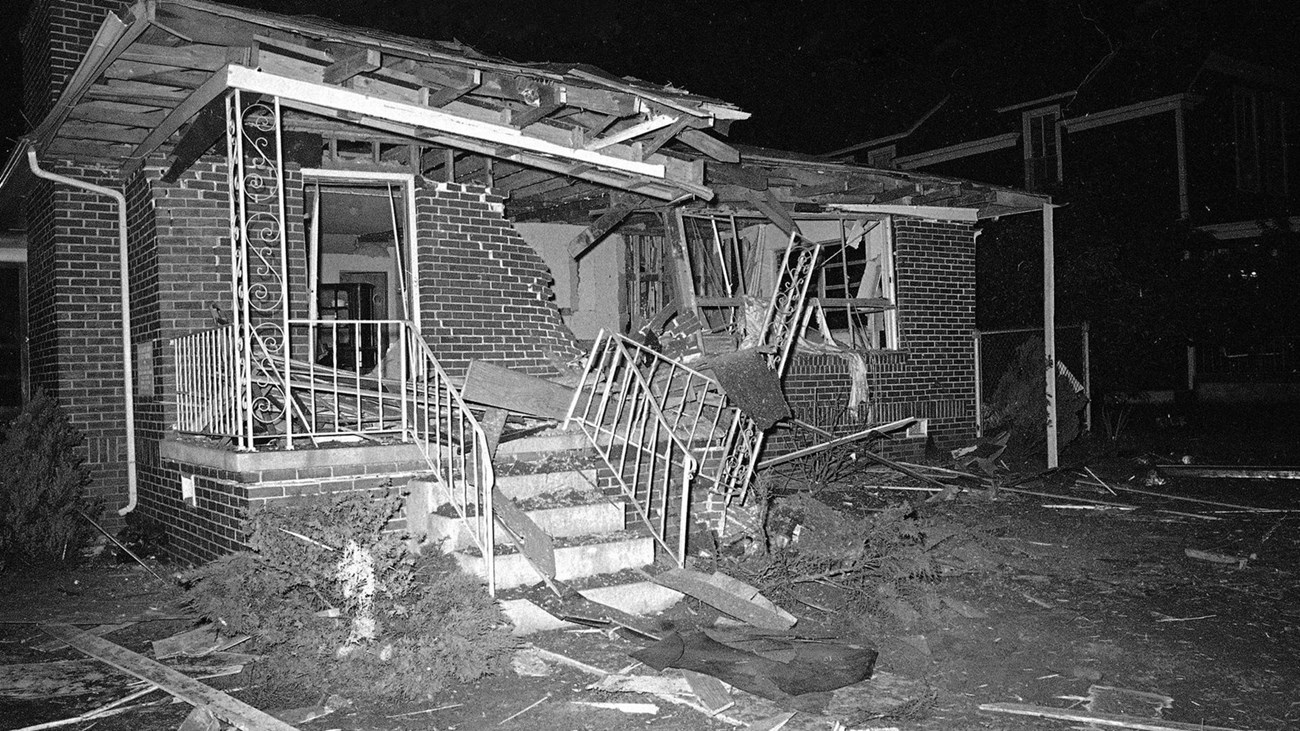Last updated: December 5, 2023
Article
A.D. King Home (Birmingham, Alabama)

Associated Press
Alfred Daniel (A.D.) William King, Sr. made national contributions to advancing the goals of the Civil Rights movement as a minister, civil rights activist, and a leader in the Southern Christian Leadership Conference. His Alabama home served as the local parsonage of the First Baptist Church of Ensley, a congregation which strongly supported the grassroots movement for civil rights in Birmingham, known as the Birmingham Campaign.
As a movement leader for the Birmingham Campaign, A.D. King was at the forefront of every major civil rights event in Birmingham in 1963, a crucial year in the civil rights struggle as the city’s black community began a massive direct-action campaign to attack Birmingham’s system of segregation. King's efforts came at a time when white supremacists in Alabama – individuals as well as State and local officials – used intimidation and violence to punish those who challenged segregation and advocated for full integration of political, economic, and social life.
On May 11, 1963, A.D. King's home was severely damaged during an assassination attempt, when a pair of bombs were detonated outside of his home while he, his wife Naomi, and their five children (Alfred Daniel Jr., Alveda, Vernon, Derek, and Darlene) were present, illustrating the constant threats of violence and death experienced by those who dared to challenge systemic racism and segregation. It became clear that the bombing was a part of a coordinated attack when a second bomb went off later that night at the headquarters for the Birmingham Campaign at the A.G. Gaston motel, and where King’s older brother, Dr. Martin Luther King Jr., and other organizers were staying. The bombings led to civil unrest as nearly 2,500 people took to the streets in protest. A.D. King was among the African-American leaders who help to peacefully disperse the crowd. For the next half decade A.D. King continued to be involved in the civil rights movement in Birmingham and beyond, assisting his older brother Dr. Martin Luther King Jr. and often traveling with him across the Deep South.
After A.D. King’s untimely passing in 1969, longtime First Baptist members, former deacon Omie R. Crockett Sr. and his wife, Naomi, purchased King’s former residence in 2005, undertaking major renovations to restore the parsonage, preserving its history and connection to the movement.
Naomi Ruth Barber King, A.D. King's widow, committed the rest of her life to making the contributions and legacy of her late husband more publicly known, and in 2008, she established the A.D. King Foundation in Atlanta, Georgia to educate the public about the history of the civil rights movement.
The A.D. King’s Home was listed in the National Register of Historic Places in 2008 in recognition of the significance of A.D. King’s activism during the modern Civil Rights movement and in September 2020 it was included in the African American Civil Rights Network.
The African American Civil Rights Network recognizes the United States African American Civil Rights Movement and the sacrifices made by those who fought against discrimination and segregation. Created by the African American Civil Rights Act of 2017, and coordinated by the National Park Service, the Network tells the stories of the people, places, and events of the African American Civil Rights Movement through a collection of public and private resources to include properties, facilities, and programs.Through preservation, commemoration, interpretation, and education these resources offer a comprehensive overview of the people, places, and events associated with the African American Civil Rights Movement.
